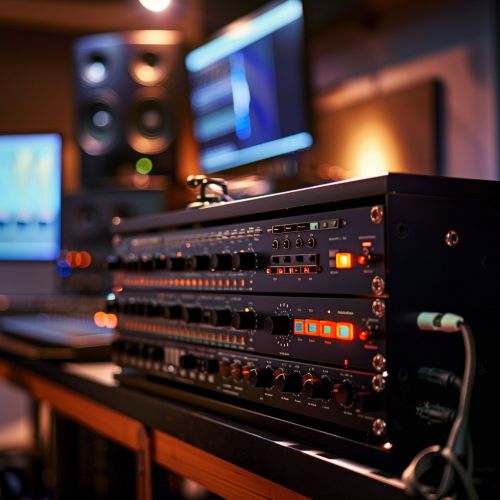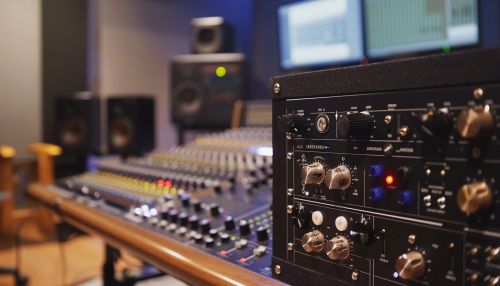Comparison between Superplex-MkII and Plexmaster Pro Plus
Introduction
The Superplex-MkII and Plexmaster Pro Plus are two advanced audio processing units that have garnered significant attention in the professional audio industry. Both devices are designed to enhance audio quality, offering a range of features that cater to different aspects of sound engineering. This article provides a comprehensive comparison between these two units, delving into their specifications, functionalities, and applications.
Technical Specifications
Superplex-MkII
The Superplex-MkII is renowned for its high-fidelity audio processing capabilities. It features a 24-bit/192kHz digital-to-analog converter (DAC) and supports a wide dynamic range of up to 120dB. The unit is equipped with multiple input and output options, including XLR, TRS, and AES/EBU connections, making it versatile for various professional setups.
Key specifications:
- **DAC**: 24-bit/192kHz
- **Dynamic Range**: 120dB
- **Inputs/Outputs**: XLR, TRS, AES/EBU
- **Frequency Response**: 20Hz to 20kHz ±0.1dB
- **Total Harmonic Distortion (THD)**: <0.001%
Plexmaster Pro Plus
The Plexmaster Pro Plus is designed with a focus on precision and control. It features a 32-bit/384kHz DAC, providing an even broader dynamic range of up to 130dB. This unit also includes advanced digital signal processing (DSP) capabilities, allowing for intricate audio manipulation. Its connectivity options include XLR, TRS, S/PDIF, and USB, catering to a wide array of professional audio environments.
Key specifications:
- **DAC**: 32-bit/384kHz
- **Dynamic Range**: 130dB
- **Inputs/Outputs**: XLR, TRS, S/PDIF, USB
- **Frequency Response**: 10Hz to 40kHz ±0.05dB
- **Total Harmonic Distortion (THD)**: <0.0005%


Functionalities
Superplex-MkII
The Superplex-MkII excels in providing high-quality audio reproduction with minimal distortion. Its primary functionalities include:
- **Noise Reduction**: Advanced algorithms to minimize background noise.
- **Equalization**: Multiple bands of parametric EQ for precise tonal adjustments.
- **Compression**: Multi-band compression to manage dynamic range effectively.
- **Reverb and Delay**: High-quality reverb and delay effects for spatial enhancement.
Plexmaster Pro Plus
The Plexmaster Pro Plus offers a more extensive range of functionalities, emphasizing control and customization:
- **Advanced DSP**: Sophisticated DSP algorithms for detailed audio manipulation.
- **Real-Time Analysis**: Integrated real-time spectrum analyzer for monitoring audio frequencies.
- **Customizable Presets**: User-defined presets for quick recall of settings.
- **Network Connectivity**: Ethernet and Wi-Fi capabilities for remote control and integration with other devices.
Applications
Superplex-MkII
The Superplex-MkII is widely used in environments where audio fidelity is paramount. Common applications include:
- **Recording Studios**: Ensuring high-quality audio capture and playback.
- **Broadcasting**: Delivering clear and precise audio for radio and television.
- **Live Sound**: Enhancing sound quality in live performance settings.
Plexmaster Pro Plus
The Plexmaster Pro Plus is favored in scenarios requiring detailed audio control and customization. Typical applications include:
- **Post-Production**: Fine-tuning audio tracks for film and television.
- **Sound Design**: Creating intricate soundscapes for multimedia projects.
- **Audiophile Setups**: Providing high-resolution audio playback for discerning listeners.
Performance Comparison
Audio Quality
The Plexmaster Pro Plus, with its 32-bit/384kHz DAC, offers superior audio resolution compared to the Superplex-MkII's 24-bit/192kHz DAC. This results in a more detailed and dynamic sound, particularly noticeable in high-resolution audio formats.
Dynamic Range
The Plexmaster Pro Plus also boasts a higher dynamic range of 130dB, compared to the Superplex-MkII's 120dB. This allows for greater headroom and a more nuanced representation of audio signals, making it ideal for critical listening environments.
Connectivity
While both units offer extensive connectivity options, the Plexmaster Pro Plus includes additional digital inputs and outputs, such as S/PDIF and USB, providing greater flexibility for integration with modern digital audio workstations (DAWs) and other digital devices.
User Experience
Superplex-MkII
Users of the Superplex-MkII often praise its straightforward interface and reliability. The unit's robust build quality and intuitive controls make it a favorite among audio professionals who prioritize ease of use and consistency.
Plexmaster Pro Plus
The Plexmaster Pro Plus, on the other hand, is lauded for its advanced features and customization options. Its user interface, while more complex, offers greater control over audio parameters, making it suitable for users who require detailed audio manipulation capabilities.
Price and Value
Superplex-MkII
The Superplex-MkII is generally more affordable, making it an attractive option for smaller studios and independent audio professionals. Its balance of performance and cost-effectiveness ensures it remains a popular choice in the market.
Plexmaster Pro Plus
The Plexmaster Pro Plus, with its advanced features and higher specifications, commands a higher price point. However, for those who require its extensive capabilities, the investment is often justified by the superior audio quality and flexibility it provides.
Conclusion
In summary, both the Superplex-MkII and Plexmaster Pro Plus are exceptional audio processing units, each with its own strengths. The Superplex-MkII is ideal for users seeking high-fidelity audio with straightforward functionality, while the Plexmaster Pro Plus caters to those who need advanced control and customization. The choice between the two ultimately depends on the specific requirements and budget of the user.
